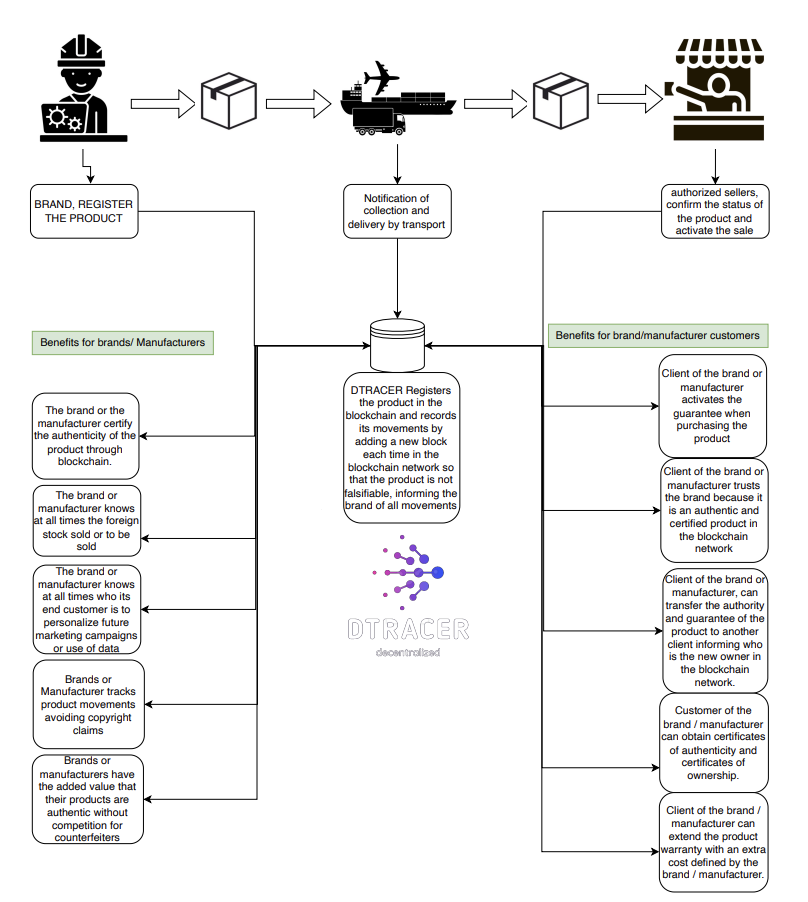What is product traceability, and how does Dtracer ensure it?
Product traceability refers to the ability to track and trace a product’s journey from its origin to its final destination. It provides valuable information about the product’s creation, distribution process, and any alterations it may have undergone along the way.
This level of transparency is particularly crucial in industries such as food, pharmaceuticals, consumer goods, and more.
Dtracer offers a comprehensive solution for traceability, addressing the complex supply management challenges faced by companies operating in different locations.
By digitizing supply chains and optimizing processes, Dtracer enables precise data traceability and efficient supply chain management.
The primary goal of traceability with Dtracer is to provide consumers with access to accurate information about the origin and distribution of a product.
From its inception to its final stage, every step is meticulously recorded and made available to stakeholders. This ensures that customers can make informed decisions based on reliable information regarding the product’s history and authenticity.
Furthermore, traceability with Dtracer safeguards the integrity of the supply chain and protects goods against counterfeiting and overproduction issues. Real-time information is continuously updated, allowing quick actions to address any incidents that may arise.
How does Dtracer achieve this?
Each product is assigned a unique identification number, and a QR code is generated for easy scanning. Whenever the QR code is read by authorized vendors, transport operators, or end customers, the system automatically registers the product’s position, time, and location.
Additional information about the product’s status is also captured and stored.
With this comprehensive data, brands gain valuable insights into the whereabouts of their products, the condition in which they reach their final customers, and the identity of the buyers.
This level of transparency enables brands to identify their end customers, track transit times, and monitor the product’s journey through various checkpoints.
At Dtracer, we are committed to delivering robust traceability solutions that empower brands and ensure the integrity and authenticity of their products throughout the supply chain.

Advantages of Blockchain-based Traceability: Boosting Transparency and Decentralization
Traceability with blockchain offers a multitude of benefits that enhance transparency and decentralization in various industries.
- Public and Immutable Information:
Blockchain ensures that information is publicly available and cannot be altered or controlled by a single entity. This feature promotes transparency and trust among stakeholders as they can access verified and tamper-proof data regarding a product’s origin, production, and distribution. - Decentralization:
Blockchain’s decentralized nature extends beyond infrastructure to applications. It encourages collaboration among multiple actors in a shared, preferably public, space. By eliminating central intermediaries, traceability becomes more efficient, secure, and resistant to manipulation. - Enhanced Security:
Blockchain’s cryptographic algorithms ensure the integrity and confidentiality of data. Each transaction or record is encrypted, making it nearly impossible for unauthorized parties to tamper with or compromise the information. This high level of security builds trust among participants and reduces the risk of fraud or counterfeiting. - Improved Supply Chain Efficiency:
Blockchain-based traceability streamlines supply chain processes by eliminating traditional paperwork, manual verification, and reconciliation. Smart contracts automate and enforce predefined rules, facilitating seamless interactions and minimizing errors, delays, and disputes. This efficiency translates into cost savings, faster product recalls, and improved customer satisfaction. - Consumer Empowerment:
With blockchain-enabled traceability, consumers gain access to reliable and comprehensive information about the products they purchase. They can verify the authenticity, quality, and ethical standards associated with a particular item, enabling them to make more informed and responsible buying decisions. - Sustainability and Ethical Sourcing:
Blockchain can play a vital role in promoting sustainable and ethical practices. By tracking and recording every step of a product’s journey, including sourcing, manufacturing, and distribution, blockchain enables companies and consumers to ensure compliance with environmental standards, fair trade practices, and labor rights.
In conclusion, traceability powered by blockchain offers an unparalleled level of transparency, decentralization, security, and efficiency. It empowers consumers, strengthens supply chain integrity, and fosters sustainable and ethical practices. Embracing blockchain-based traceability is a transformative step towards a more trustworthy and accountable global ecosystem.
